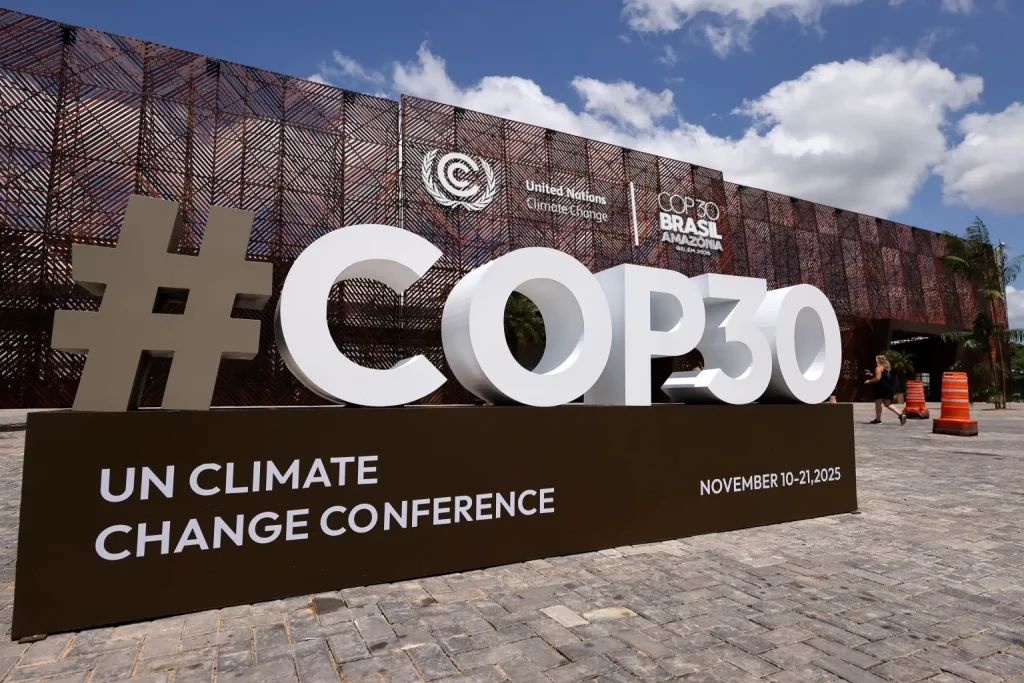Global climate negotiations return to the spotlight as Brazil hosts a historic conference
Starting Monday, November 10, the city of Belém officially becomes Brazil’s temporary capital—and, more importantly, the world’s epicenter for climate negotiations. For the first time, a Conference of the Parties (COP30) is being held inside the Amazon, the planet’s most biodiverse biome and a crucial regulator of global climate systems.
Running until November 21, the event brings together delegations from 194 countries plus the EU, with an estimated 50,000+ attendees: negotiators, scientists, civil society leaders, youth groups, and policymakers.
This edition carries a heavy responsibility: restoring climate change to the top of the international agenda amid geopolitical tensions, armed conflicts, and rising emissions.
A Summit With Urgency
COP30 gained momentum after the Climate Summit, also held in Belém, where leaders and diplomats from around 70 countries met to align strategies to prevent global warming from exceeding 1.5°C—the Paris Agreement’s core commitment.
Brazil’s President Luiz Inácio Lula da Silva, host of COP30, called this conference:
“The COP of truth.”
He reaffirmed the need for a decisive global plan for the phased and accelerated transition away from fossil fuels—the source of 75% of global emissions, according to Climate Watch.
Climate expert Márcio Astrini, executive secretary of the Climate Observatory, highlighted the significance:
“We need a roadmap. How will the transition happen? When will it start? What is the timeline, the scale, the funding? These answers are essential.”
A Challenging Global Context
Despite the urgency, climate action faces setbacks:
- Fewer than 80 countries have updated their Nationally Determined Contributions (NDCs).
- Major emitters—including India—have not updated targets.
- The U.S. has once again taken a climate-denialist position, undermining progress.
- Global CO₂ emissions spiked last year, reversing previous gains.
Astrini criticized the lack of commitments during the recent summit:
“Countries simply didn’t deliver. We expected new promises—and they didn’t come.”
In his final letter before the conference, COP30 president-designate Ambassador André Corrêa do Lago urged nations to turn Belém into “a cycle of action,” grounded in cooperation and unity.
Three Core Themes of COP30
Negotiators anticipate three major pillars shaping the talks:
1. Climate Adaptation
How nations prepare for extreme weather—like the tornado that devastated Rio Novo do Iguaçu in Paraná—is a central focus. COP30 aims to define indicators for the Global Goal on Adaptation, a benchmark to measure global progress.
2. Just Transition
COP30 is expected to formally integrate a work program on just transition, outlining how economies can shift away from fossil fuels without harming workers, especially in vulnerable sectors.
3. Implementing the Global Stocktake (GST)
The GST, first completed at COP28 in Dubai, provides a reality check on global climate efforts. COP30 must now turn its recommendations into action.
The Bottleneck: Climate Finance
None of the above is feasible without money—and funding remains the biggest obstacle.
Developed nations have long promised climate financing but delivered far less than pledged. This failure has created deep mistrust.
To address this, COP29 and COP30 jointly prepared the “Baku to Bethlehem Roadmap,” aiming to mobilize USD 1.3 trillion annually for climate action.
Brazil also launched a major initiative:
Tropical Forest Forever Facility (TFFF)
- Over USD 5.5 billion already pledged
- Supports conservation in 70+ tropical countries
- At least 20% goes directly to Indigenous and traditional communities
Civil Society: The Heart of COP30
Belém is buzzing with parallel events beyond the official “Blue Zone.”
Green Zone – Open to the Public
Located in Belém’s City Park, this vibrant space showcases:
- Indigenous and traditional knowledge
- Climate tech and innovation
- Environmental education
- Youth movements
- Cultural exchanges
COP30 is expected to host the largest Indigenous mobilization in conference history, with over 3,000 participants.
Climate Observatory’s Astrini explains why this matters:
“Climate affects our daily lives—food prices, electricity bills, harvests. It’s not an abstract topic. It’s life.”
People’s Summit: Global Social Movements Unite
Beginning Wednesday, November 12, the People’s Summit will gather social movements at the Federal University of Pará (UFPA). Events include:
- A boat parade on the Guamá River
- Assemblies with Indigenous, quilombola, and riverside communities
- International delegations from 62+ countries
- A major march on November 15
Indigenous leader Dinamam Tuxá of APIB stresses the need for real action:
“At every COP, agreements were made but not fulfilled. Now we need implementation—and a seat at the table for those who protect the land.”
A Historic COP Begins
With record participation, deep social engagement, and intense global scrutiny, COP30 in Belém has the potential to redefine the world’s climate trajectory.
Whether nations will deliver the “truth” that President Lula demands remains the defining question.


